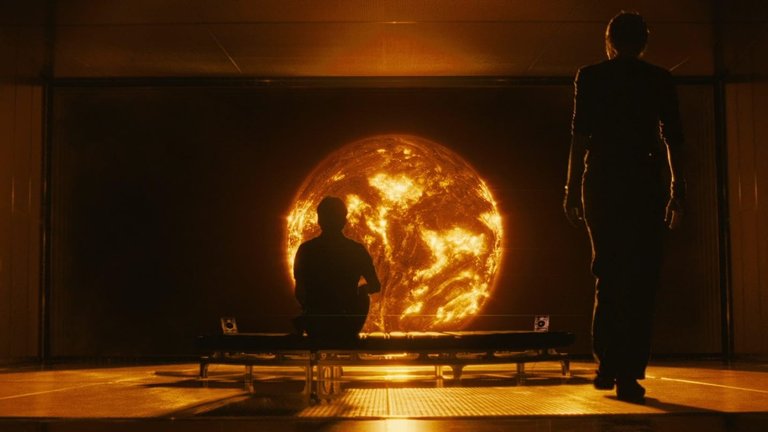Film Review: Sunshine (2007)

Fans of science fiction cinema have spent decades wondering when or if ever someone would deliver on the big screen a "pure" genre classic in the ranks of 2001: A Space Odyssey. The answer to that question came closest to being given in 2007 with the release of Sunshine, a film directed by Danny Boyle.
The plot is set in 2057, when humanity and all life on Earth are in danger of becoming extinct due to the Sun slowly fading away. In order to prevent this, the world's governments have launched Icarus II, a spaceship armed with a nuclear fission payload, supervised by physicist Robert Capa (played by Cillian Murphy), which is to detonate near the Sun and hopefully reignite the solar fusion process. This isn't the second such mission, because the original Icarus mysteriously ceased contact with Earth without its crew completing its task. Upon passing Mercury, Icarus II receives a distress beacon from Icarus, so Capa talks Captain Kaneda (played by Hiroyuki Sanada) into temporarily departing from course to investigate and hopefully increase the chances of mission success by obtaining two payloads instead of one. This decision, however, leads to all kinds of disasters and the dwindling crew of Icarus II soon discovers that the failure of the previous mission was the result of sabotage.
The basic premise behind Sunshine has a lot of resemblance to Solar Crisis, a relatively obscure Japanese-American film from 1990 starring Tim Matheson and Charlton Heston. However, Danny Boyle, one of the most respected and versatile British film directors in recent decades, has built his film more on the legacy of 2001, as well as some of the grand genre classics like Solaris, Alien, or somewhat lesser-known but influential titles like Silent Running and Dark Star.
Helped by a relatively large budget, Boyle has invested a lot of effort to make the futuristic story about a world-saving space mission not only visually impressive but also convincing for those who take "science" in science fiction more seriously. Science fiction is often called "the genre of ideas" or the thinking man's genre, and as such, Alex Garland's script doesn't disappoint. It not only elaborates on how the world would react to the prospect of the Sun fading away but also how this would affect the people tasked with an unimaginable responsibility to stop it.
This, in turn, reflects in the realization that the humanity, and especially the single individual, seems unimportant in the grand scheme of a cold and uncaring universe. Many people who watch Sunshine would start asking deep philosophical questions about the meaning of life. This included not only the characters in the film but the actors playing them, like Cillian Murphy, who, by his own admission, became an atheist after working on the project.
Murphy, whose role of a physicist can be, in retrospect, seen as a test run for his later Oscar-winning role in Oppenheimer, was part of a talented and diverse ensemble cast. They are playing well-defined sets of different but recognizable characters for whom the audience can easily attach to and begin to worry when the action starts and their numbers begin to dwindle.
Boyle has also had a good team of production designers and special effects specialists who managed to make Icarus II a fascinating plot setting, with its light, high-tech interiors in sharp contrast to the blackness of space and, ironically, the lightness of the Sun whose heat and rays prove to be deadly instead of a source of life.
The musical soundtrack by the electronic group Underworld and composer John Murphy also adds a lot to the atmosphere, creating one of the most recognizable pieces of film music in the 21st Century.
The general tone of the film is very depressive, and Garland's script perhaps goes too far in that direction by abstaining from even the lightest touch of humor and keeping everything too serious. This is probably the reason why, in order to make Sunshine more commercially viable, it switches its tone from serious drama into action. The last third, with rather unconvincing plot twists, goes even further and turns Sunshine into a slasher film, with all the annoying cliches and predictability that go with that genre.
As a result, what was supposed to be a grand classic of 21st Century science fiction cinema turns into a major disappointment; it was treated as such by the audience that turned it into a massive box office bomb. Danny Boyle, burned by the experience, said that he would never make a science fiction film ever again.
Regardless of its initial, and partially deserving, failure, Sunshine is still a very good film. Despite compromising its tone and basic concept, it still shows that great science fiction films that "they don't make any more" could still be made, only with a little bit more luck and consistency that Boyle showed here.
RATING: 7/10 (+++)
Blog in Croatian https://draxblog.com
Blog in English https://draxreview.wordpress.com/
InLeo blog https://inleo.io/@drax.leo
Hiveonboard: https://hiveonboard.com?ref=drax
Rising Star game: https://www.risingstargame.com?referrer=drax
1Inch: https://1inch.exchange/#/r/0x83823d8CCB74F828148258BB4457642124b1328e
BTC donations: 1EWxiMiP6iiG9rger3NuUSd6HByaxQWafG
ETH donations: 0xB305F144323b99e6f8b1d66f5D7DE78B498C32A7
BCH donations: qpvxw0jax79lhmvlgcldkzpqanf03r9cjv8y6gtmk9
Posted Using InLeo Alpha
The movie seems interesting, I have an interest in science fiction so I might give it a watch, is it available on netflix?
La verdad es que esa película Me encantó especialmente es la parte final cuando muestran como el sol se activa con la explosión nuclear se asemeja como cuando prendes un poco de luz